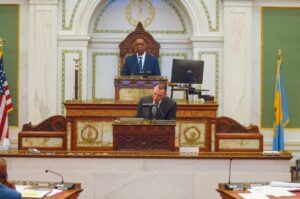记者/Reporter:Cory Clark
费城的小企业主们呼吁政府利用可用数据改善商业法规、优化商业服务、降低办理许可证和证照的难度,以及减少小企业的工资和营业税。
为了实现这些改革,市议会推出了“简化营商环境”决议,得到了十名联合发起人的支持,呼吁改革城市的税收结构。
PHILADELPHIA- Small business owners have called on the administration to use available data to improve business regulations, optimize business services, reduce permitting and licensing hurdles, and reduce wage and business taxes for small businesses.
City Council Introduced an Ease of Doing Business resolution with ten co-sponsors calling for reforms to the city’s tax structure.

本报记者拍摄
Photographed by Metro Chinese
虽然该决议承认改善营商环境对社区和家庭的稳定至关重要,同时指出优化费城商业环境可以创造更多高薪就业机会,帮助扶贫和改善个人和社区的状况。但市议会似乎更关注为大型企业提供税收优惠,而非实质性地关注需求更大的社区小企业和初创企业为它们简化系统步骤。
While the resolution recognizes the importance of improving the ease of doing business to the stability of communities and families, noting that improving how the city fosters business could produce more good-paying jobs, helping lift individuals and communities out of poverty. City Council seems to focus more on tax breaks for large corporations than the more substantial needs of the community to streamline systems integral to small businesses and start-ups in the city.
亚利桑那州立大学2020年的一份报告显示,费城在80个美国城市的营商环境排名中位列71。费城大都市区的私营部门增长率仅为1.6%,低于全国平均水平。根据劳工统计局的数据,如果考虑到卡姆登和威明顿,则增长率降至1.1%。
Philadelphia is ranked 71 out of 80 U.S. cities for ease of business, according to a 2020 report by Arizona State University. It is below the national average in job growth, with a growth rate of only 1.6 percent of private sector growth in the Philadelphia Metropolitan area. When Camden and Wilmington are included, it drops to 1.1 percent, according to the Bureau of Labor Statistics.
根据2022年费城营商环境调查,55%的企业仍未从疫情中恢复过来。同时,48%的受访者表示犯罪对他们的恢复产生了影响。65%的拥有1-5名员工的小企业主表示他们不会推荐在费城做生意。
According to the 2022 Philadelphia Ease of Doing Business Survey, 55 percent of businesses still hadn’t recovered from the pandemic. At the same time, 48 percent of respondents said crime impacted their recovery. Sixty-five percent of small business owners with 1-5 employees said they wouldn’t recommend doing business in Philadelphia.
费城的营业收入和收据税(BIRT)按利润的6.25%和销售额每1000美元的1.415%的比率对企业征税;它是唯一同时征收营业税和销售税的大城市,而在30个最大城市中,只有11个城市中的一个税种会被征收。更加使情况恶化的是一系列的税收激励措施和免税政策,通常被称为税收支出。
Philadelphia’s Business Income and Receipts Tax (BIRT) taxes businesses at a rate of 6.25 percent on profits and 1.415 percent on sales per 1,000 dollars; it is the only large city that does both, 11 of the 30 largest cities tax one or the other. Exasperating the situation is the host of tax incentives and exemptions, often referred to as tax expenditures.
这些税收支出通常被吹嘘为吸引、扩大和维持企业或税收基础的投资。但批评者认为这些豁免规定会浪费公共资源,而且缺乏问责或证据证明它们的有效性。宾夕法尼亚州政府合作局在2012年得出结论:“缺乏详细的会计记录,无法系统地评估这些政策是否在利益方面值得推行。”
These tax expenditures are often touted as investments in attracting, growing, and maintaining businesses or the tax base. Critics see these exemptions as a drain on public resources with little accountability or evidence that they work. “A lack of detailed accounting prevents a systematic process of evaluating whether these policies are justified in relation to their benefits,” concluded the Pennsylvania Intergovernmental Cooperation Authority in 2012.
“我们必须有意识地行动,而不是一时兴起,” 市长公共参与办公室执行主任Romana Lee-Akiyama强调。“有意识是推动我们社区经济增长的关键。”
“We have to be intentional, not accidental,” Romana Lee-Akiyama, Executive Director of the Mayor’s Office of Public Engagement. “Intentionality is the key to growth in our communities.”
许多中小型企业都觉得这样的税收、激励和豁免政策非常混乱。再加上处理城市机构、监管结构和筹集资本的困难,让小企业起步几乎是一件奇迹。
Many small to medium size businesses find this cornucopia of taxes, incentives, and exemptions confusing. Combining this with the difficulty of dealing with the city’s agencies, regulatory structure, and raising capital, It’s a miracle any small business can get off the ground.
“我曾经在第13街租了一个地方,打算投资10万美元进行翻新和建设,但我们无法从市政方面获得许可证,所以不得不放弃租约,以至于损失了数万美元,” 南费城Tabachoy菲律宾餐厅的老板Chance Anies说道。“我们很幸运有足够的资本重新站起来并继续经营餐厅,但对于许多其他人来说,这种挫折可能会毁掉他们的梦想。”
“I was renting a place on 13th street, and I was going to invest a 100 thousand dollars into renovations and construction, but we couldn’t get momentum from the city on permitting, so we had to let the lease go; we lost 10s of thousands of dollars,” said Chance Anies owner of Tabachoy a Filipino Restaurant in South Philly. “We were lucky to have enough capital to get back on our feet and move forward with the restaurant; for many others, this sort of setback would have been the end of their dream.”
“我们需要城市居民走出来与社区互动和倾听,” Unrivaled的老板Pheng Seng说道。“我们需要他们为小企业创造更便利的环境,减少繁文缛节,简化税收和SBA申请流程,让它们更加简单易懂。”
“We need city folks to come out and interact and listen to the community, ” said Pheng Seng, owner of Unrivaled. “We need them to make things easier for small businesses, less red tape, streamline taxes, and the SBA process, make it less technical.”
2019年,费城正式采纳了《费城企业主权利法案》,详细规定了每个企业主的权利,如透明度、公正性和一致性等在执行规定和程序时的应用。然而问题在于,87%的企业主并没有意识到这份文件的存在。
In 2019 Philadelphia Officially adopted the Philadelphia Business Owners’ Bill of Rights, which outlines the rights of every business owner; rights like transparency, fairness, and consistency in applying regulations and procedures. The issue is that 87 percent of business owners aren’t aware of this document.
“当我们刚开始经营时,我们不知道应该去找谁;我们需要更好地宣传小企业的项目,” Seng说道。
“When We opened, we didn’t know who to go to; we need to publicize programs for small businesses better,” said Seng.
“可获得性是非常重要的,我花了几周时间申请我开业所需的资助,虽然我来自金融界,知道自己在做什么,但可获得性的缺乏可能会是一个巨大的障碍,” Baby’s Filipino Kitchen and Market的老板Raquel Villanueva表示。
“Accessibility is essential, it took me weeks to do the grants I needed to start my business, and I knew what I was doing because I came from the world of finance, so accessibility or the lack of it can be a huge hindrance,” said Raquel Villanueva, owner of Baby’s Filipino Kitchen and Market.
如果费城想要改善就业增长并为企业家创造机会,它需要倾听小企业和他们所在的社区的声音,而不是那些已经拥有所有资源的亿万富翁阶层。小企业是这座城市的支柱,但它们却拥有最少的资本、城市机构和服务。简化规定、税收和激励措施,并使机构更加可访问和对社区负责,将推动企业增长和就业创造。
If Philadelphia wants to improve job growth and create opportunities for entrepreneurship, it needs to listen to small businesses and the communities they’re in, not the billionaire class who already have all of the resources they could ever want. Small businesses are the backbone of this city but have the least access to capital, city agencies, and services. Streamlining regulations, taxes, and incentives and making agencies more accessible and accountable to communities would drive business growth and job creation.




